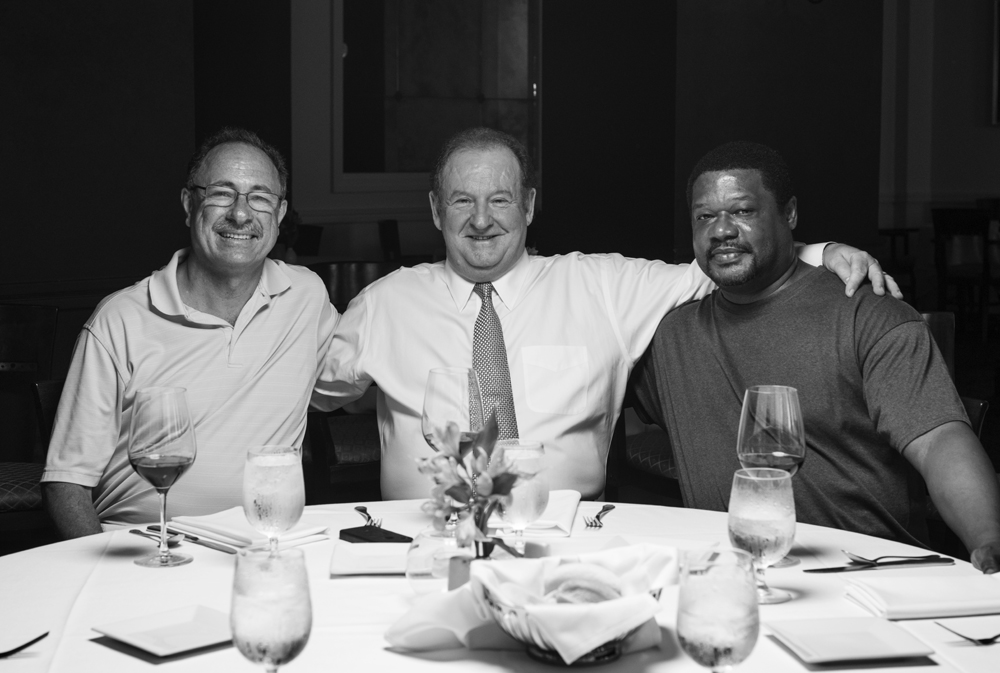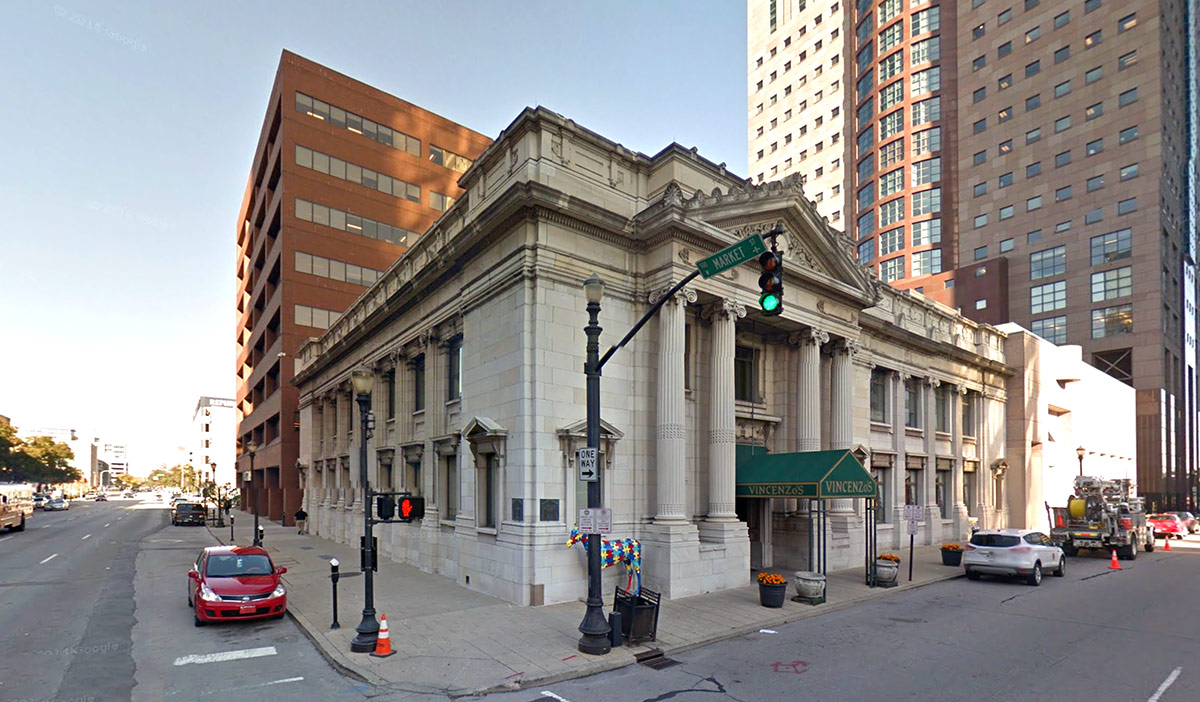[Originally Published in the Winter 2015 issue of Food & Dining Magazine.]
Many who remember Casa Grisanti say restaurant service in Louisville was never better. And those who really know their restaurants can point to places such as Vincenzo’s, Corbett’s, the English Grill and others as standard bearers of that service tradition. Not ironically, a handful of employees at those three restaurants were veterans of Casa Grisanti, most notable among them, Vincenzo Gabrielle. He was hired as the restaurant’s maître d’ in 1975 and later became a partner with Michael Grisanti.
Still working with Gabrielle are three captains he trained at Casa Grisanti: George Stinson, his brother Steven Stinson, and Willie Bizzel. That trio alone has logged a collective 120 years in the restaurant industry. Food & Dining sat down with all but Steven Stinson (who was unable to make the interview) to talk about how restaurant service has changed over the past four decades.
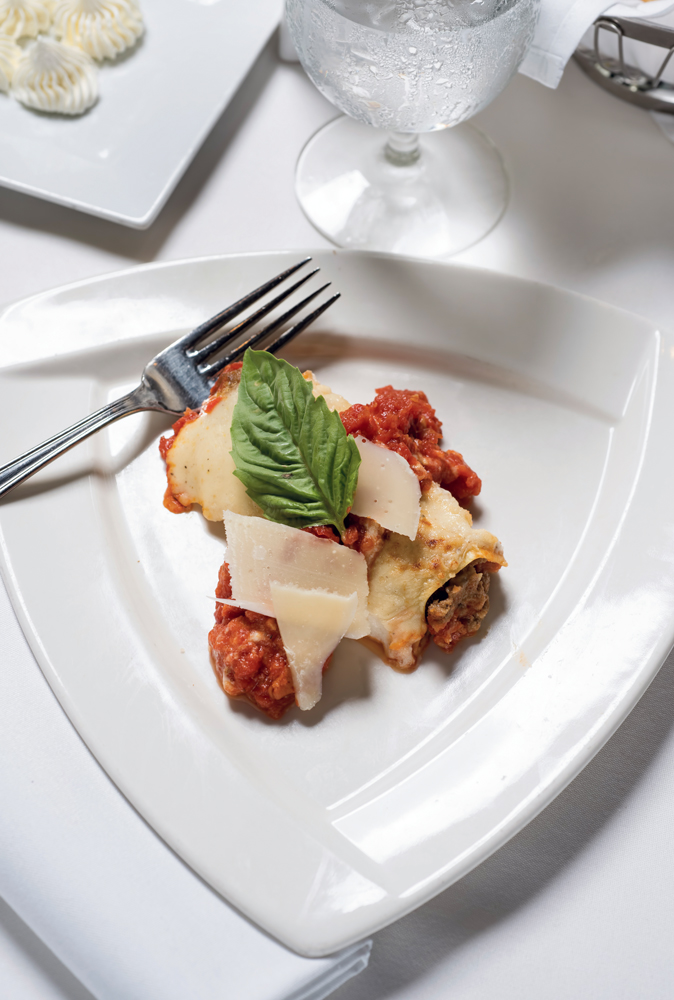
Food & Dining: How long have you been in restaurants, Vincenzo?
Vincenzo Gabrielle: I came from Palermo, Sicily on April 4, 1969, and by April 5th, I had a job at Tony’s (restaurant) in St. Louis. I spoke no English, never even really worked before, but I got a job, an opportunity to work in America!
So imagine this 21-year-old speaking no English, and people ask him a question … I would just smile at them and go to the people who spoke English to see what they wanted. It worked!
F&D: George, how about you?
George Stinson: I’m honestly not sure: 1975, I think? I was there before you got to Casa,Vincenzo. I was working as a busboy. Heck, it might have been 1974. It was a long time ago.
F&D: Willie, was Casa your first job, too?
Willie Bizzel: No, my first job was as a busboy at the old Cunningham’s. I was only 14, and it was 1972.
GS: Man, we’re old!
WB: But still working!
F&D: Vincenzo, explain to readers who never experienced the level of service practiced at Casa Grisanti.
VG: I was recruited to come here and duplicate the same system we had at Tony’s: one captain and assistant for every four tables, and two busboys for the entire dining room. We had people everywhere — that’s very expensive. But we paid attention to every detail. Made Caesar salad at the table, made fettuccine Alfredo from scratch at the table.The guest had to do nothing but eat and drink.
Those servers were professionals, perfectionists who took so much pride in what they were doing.There was one captain named Chris Lombardo (who later owned Third Avenue Café), and you could never go to his station and start cooking his orders until he did because he wanted to do it himself. He was tremendous.They were all tremendous. It was a rare place.
F&D: What else makes a great server?
GS: A great waiter knows what his guests want without even being asked.
WB: They can read the table without asking questions.
VG: Casa is a good example: It was a small dining room, and guests were talking, and in a small space you don’t want to talk over the guests. And sometimes it was so crowded you couldn’t get close to another server you were trying to help. So you communicated with the eyes and the head, nodding, gesturing, but without words.
F&D: Was that something you trained them to do?
VG: It’s experience. It happens when you work with the same people for a long time.You get to know them well, how they work as a team.
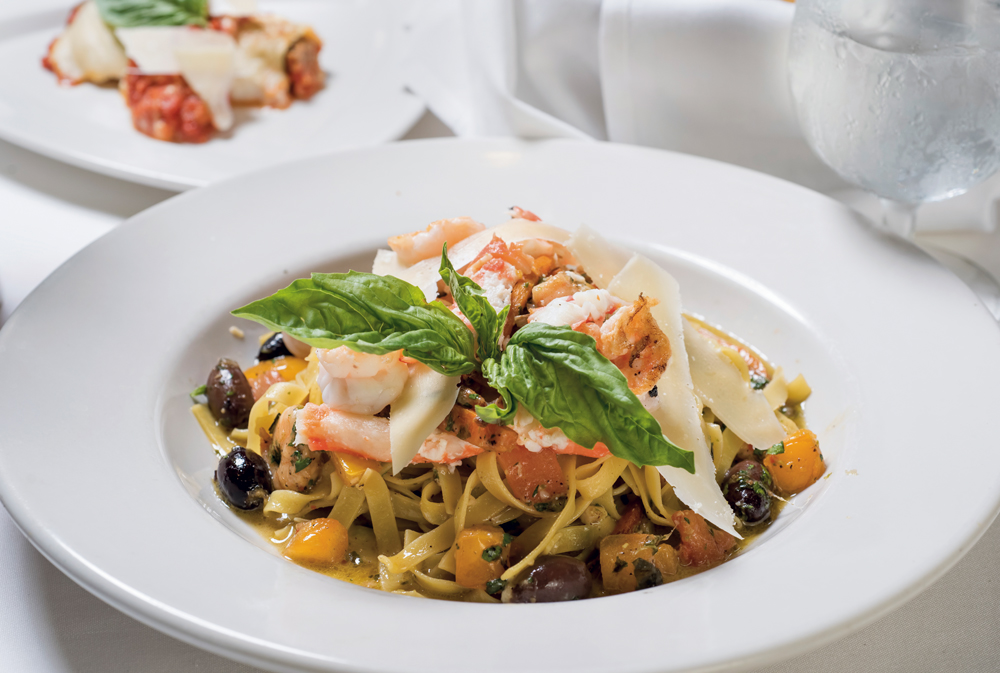
F&D: When you go out to eat, do you watch to see whether servers still read the table well?
(Silence. Shifting eyes. Furrowed brows.)
F&D: Not asking you to name restaurants, just asking whether you think servers today do what you’ve been trained to do over decades.
VG: I don’t know that I see it. Service sometimes has a plastic feel to it these days. Less personality than we like to show to our guests.
F&D: George?
GS: Oh, I don’t know that I want to add to that.
F&D: You see a wide variety of customers at Vincenzo’s ranging from people out for entertainment or for serious business. How do you handle those tables differently?
WB: You treat each table differently. If it’s a business meeting going on, I tend to leave them alone and not interrupt. If it’s a birthday, you’re more friendly to them.
GS: You read people.You watch their body language. If you’re good, you figure out quickly who wants you to joke around with them and who wants you to stay clear. But you’re still there serving them the same.
VG: Either way, you start off by being friendly without getting too familiar. But I’ve found that if it’s a party of two, they usually want you to engage them. If it’s a party of 10, you let them entertain each other.
F&D: Describe a point at which one becomes too familiar with the guest?
VG: Oh,here’s a good story,but kind of the other way.Tom Jones (the singer) came to the restaurant one night.Very friendly. He ordered a $450 bottle of wine and he wanted me to sit with him and drink it. I had no intention of drinking his wine, but I sat with him and talked and then moved on. Like Kenny Rogers said, you’ve got to know when to walk away.
GS: You can be friendly with regulars, people who say we’re like family to them. But you still keep that distance as a server because you’re working.
F&D: But guests also like it when you know their likes and dislikes intimately, too.
GS: We have lots of regulars like that.There’s one man who, when he walks in, no one even asks what he wants: we get his drink right there for him.We always know what wine to bring him and he loves it. He says we’re like his family because we know him that well.
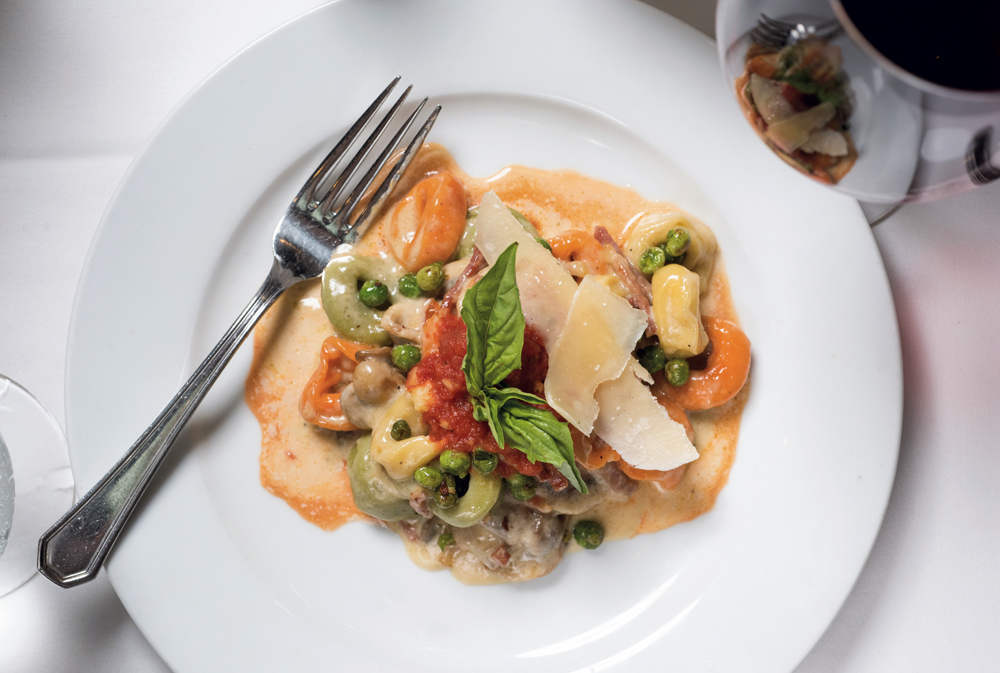
F&D: How do you deal with challenging guests?
GS: They’re all unique, so you have to try to figure them out, and probably pamper them.
VG: When that happens, they usually come in like a lion. But because we know how to treat those guests, they leave like a lamb.
Here’s a story … One time during Derby a young man and two ladies came in and said they had a 9:30 reservation. We explained that we were still on a wait and then invited him to sit in the cocktail lounge. Immediately he’s upset. He said he was so and so from New York, and that he never waits anywhere. And I smiled at him and said, “I’m Vincenzo, and I’m from Palermo, Sicily. And tonight you’ll have to wait because we don’t have your table ready.” So he went to the cocktail lounge and waited.We took really good care of him the rest of the night, and when he was leaving, he was hugging people.
GS: Exactly.You just do what you can to please them and make them feel like they’re the only person in the world.
WB: Sometimes you go beyond the call of duty, bend over backwards.You give them dessert on the house, something to make them happy. It’s not too hard.
F&D: What’s the classiest thing you ever saw a customer do?
VG: Frank Sinatra, Jr. was a true gentleman in every way possible; never acted like a celebrity. He ordered the same dish as the lady seated next to him, and the captain made a mistake and served him instead of lady first. What did he do? He moved his plate over to the young lady.
I’ve got another one: Al Pacino was in town at the same time as (Mikhail) Baryshnikov. Pacino came in first with a group of people and he was a little standoffish.You could tell he wanted to be left alone. But when Baryshnikov comes in — he’s been here before, so I know him — he sees me and hugs me and asks how I’m doing. Pacino later asked him, “Do you know him?” And he said he did. After that, Pacino was relaxed.
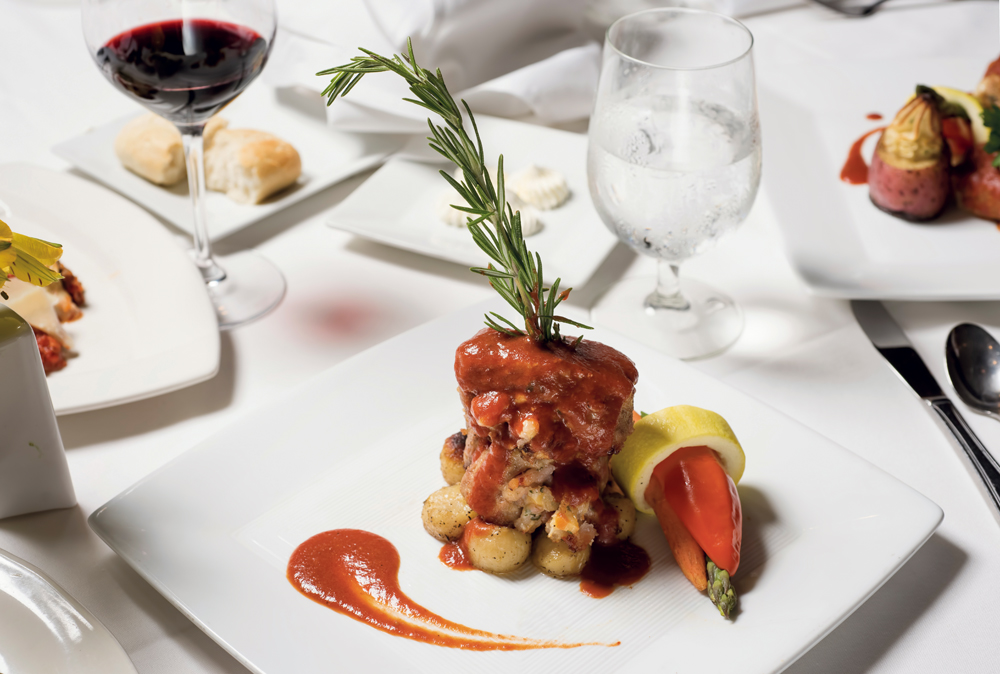
F&D: When you guys started working in restaurants four decades ago, male customers were in control of the table. That changed at all?
GS: Oh, no, he’s still in charge.
WB: You can just about feel who’s going to pay, and it’s usually the man. But you still have to read it right.
VG: One thing that’s changed is the man used to always order the wine. But now you’ll see a lady get the list and open it and say to bring her a bottle of what she wants. That’s happening more often than not.
WB: That’s right, women never used to touch the wine list.
VG: Oh, but once we had a lady many years ago who did order a bottle of wine, and it was pretty pricey. So when the bill came, the man got the check, saw what it cost and came to me and told me I should have checked with him when that was ordered. I let him know we don’t do that, that it was between them. He wasn’t happy.
F&D: Chefs and bartenders have really improved their game in the 40 years you’ve done this.Why is it servers might be lagging some?
VG: Not here! We’re still doing what we did at Casa.
F&D: But you said sometimes service has become a bit plastic at other places.
VG: I can’t say why it’s that way other places. But I can say why our service is still so good: we have experienced and dedicated people.There are only a few people like George, Willie and Steve who make a profession out of this.The majority of guys we’ve had here were working here while they went to college to become writers, doctors, engineers.That these guys and a lot of others still work here after 20, 30 years proves that this is their chosen profession. F&D



















